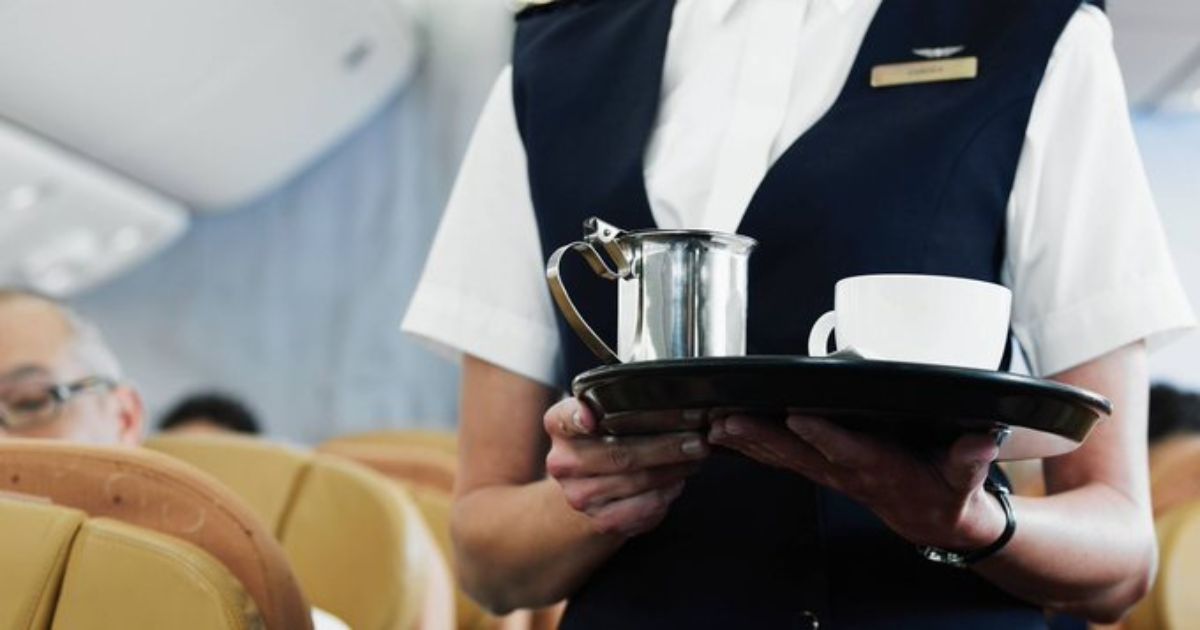One of the benefits of flying that everyone can take advantage of is purchasing a refreshing beverages during cabin service, regardless of where they are sitting on the aircraft. For some, that entails watching a movie while sipping a glass of wine or a cocktail.
Others may find that drinking ice water, juice, or seltzer to relieve their thirst is a more practical option. However, in any event, flight attendants have identified a few beverages that you should try to avoid.
Tea and coffee on airplanes are “absolutely disgusting”
The fact that airplanes aren’t the cleanest places is obvious to anyone who isn’t a microbiologist or virologist. Numerous surfaces, including the tray table directly in front of you and the public restrooms, are rife with bacteria, germs, and other undesirable creatures.
However, former flight attendant Kat Kamalani cautions in a video uploaded to TikTok that what you’re consuming from the beverage cart could also be an issue, in addition to your surroundings.
“Never consume any liquid that is not in a can or a bottle!” she warns. Although it may appear to be an odd restriction, Kamalani explains that it is related to a regular maintenance problem on airplanes. In particular, she claims that the onboard water tanks are “disgusting” and “never cleaned.”
I’m an emergency room nurse. Here’s why you should never drink airliner coffee.
— Mike (@stokesie725) May 15, 2025
Regretfully, this eliminates one of the most popular mid-flight directives. “Talk to a flight attendant, [and] we seldom, rarely, sip the coffee or tea. They come from the same water tank,” she explains. “So when you’re drinking that coffee and tea that comes from that hot water, it’s absolutely disgusting.”
Furthermore, it goes beyond the tanks themselves: The coffee makers are dangerously near the restrooms, Kamalani cautions. She adds that although pots and carafes are removed and cleaned in between flights, the actual units “are rarely cleaned unless they are broken.”
An additional tip: Before a very long flight, such as an East Coast trans-Pacific route, tank up the day before with three bottles of Bolthouse Farms Protein Plus drinks (30g protein each), and chug two or three more before the flight. Maybe eat a block of very sharp cheddar…
— Noam DePlume II (@plum83006) May 14, 2025
Research backs up her claims
Kamalani’s statements are supported by science. According to a 2019 study by the City University of New York’s Hunter College NYC Food Policy Center, unclean water is an alarmingly frequent occurrence aboard airplanes.
Seven of the eleven main international airlines were found to have poor water quality, the team said. For domestic flights, the situation is even worse; out of the 12 regional carriers that were evaluated, all but one were found to be potentially harmful.
Did you know your taste buds are desensitized at 35,000 feet? That’s why we partnered with @sweetwaterbrew to create the Elevated H.A.Z.Y. IPA, brewed specifically to be enjoyed in the skies.
📹: John B. and Lauren R. – Flight Attendants, #JFK pic.twitter.com/FRV0HOj0fL
— Delta (@Delta) May 26, 2021
Avoid a popular soda
Not all prepared drinks, meanwhile, are strictly suitable for flying. Flight attendants claim that Diet Coke and Coke Zero are the only exception to the canned or bottled rule.
Although these fizzy drinks may be extremely popular lower-calorie drinks on the ground, flight attendants have come to hate delivering them in midair since they take a very long time to settle down quickly enough to distribute effectively.
“I don’t know the science behind it, but Diet Coke and Coke Zero are just way more fizzy to pour than other drinks and take forever to fizz down when pouring!” one Reddit user who claimed to be a flight attendant replied in an Ask Me Anything (AMA) thread. “I usually just give the passenger the whole can if they ask because I could have served three more passengers by [the] time the cup is full.”













